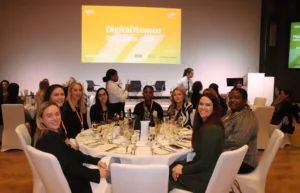What is the biggest opportunity for women in your sector of the digital industry today?
Gender equality is not only a moral and human rights concern, it’s also a powerful business opportunity. There’s a great deal of research reaffirming that diverse and gender balanced companies outperform their competitors and reap the benefits of increased collaboration, innovation and profitability. Yet despite the strong business case, women continue to be vastly underrepresented in leadership and technical roles.
I recently hosted a panel at Women of Silicon Roundabout with several inspiring female leaders to explore these issues within advertising and technology and discuss the steps for ensuring a more equitable world. All panellists openly shared their personal and professional experiences, but something Fatima Dowlet, Propositions Partner at Channel 4, said really stuck with me. She said that women should ask themselves what a man would do when placed in their circumstances – and then do it.
Research (and personal experience) shows that there is a significant gender gap in self-promotion and men typically push harder to land promotions and negotiate pay rises. As Fatima urged, it’s important for women to raise their voices and advocate for themselves like men do – in annual performance reviews and throughout their careers.
What is the biggest challenge to you as a woman in the digital industry and how are you overcoming it?
One of the biggest challenges is finding the most effective ways to support and elevate women across my company and industry. Each individual experience is unique and impacted by a host of factors like race, socioeconomic background, family and home life or health, so knowing how to support the progress of women across the board can be complex.
Over the last two years, I’ve seen so much anxiety and requests for guidance from women, so I have personally committed to meeting with as many female colleagues as possible to hear their concerns, give advice where I can, and use these insights to inform our hiring, promotion and inclusion activities going forward.
One area in particular is the impact on new parents as they come back to work – companies must carefully think about the process of exit, leave and re-entry to ease the transition and make parents feel supported and confident throughout. Buddy systems and KIT days are of course valuable, but the key role to make this work well is the manager. So, we are doing everything we can to help managers support people who are starting families.
What three things could employer companies do to make the digital industry better for women?
No two women are the same, so employers shouldn’t take a ‘one size fits all’ approach to the changes they implement. One of the first things businesses should do is implement flexible and hybrid working policies with a supportive culture for those policies. Employers should also be aware that women often have greater responsibilities at home (a McKinsey report reveals that women do three times as much unpaid care work as men). Leaders and managers must ensure they are promoting a flexible and trusting working culture that empowers individuals to determine the work schedules that best suit them, with a focus on outcomes and performance, over hours spent in the office.
Secondly, employers should ensure that they have generous paid parental leave policies that extend beyond minimum legal requirements and include paternity leave options for men and same sex couples. Leaders and managers should consider ways to encourage and support full use of parental leave benefits and create a supportive environment for new parents – whether they are going on leave or returning to work.
Finally, employers should develop recruitment strategies focused on hiring more women and people of colour – especially in leadership and technical roles. Most companies have sizable gender and diversity gaps when it comes to leadership and technical positions. So the first step to closing these is re-thinking where and how you recruit, as well as how to support and promote people within the company. At The Trade Desk, we are especially focused on hiring more female engineers and connecting with diverse talent pools.
What support structures and organisations are most important and effective to you as a woman in the digital industry?
I can’t speak highly enough of the importance of mentors and sponsors. In fact, research by Forbes shows employees with mentors are promoted five times more often than their non-mentored peers. In my career, mentors have given me the necessary advice and confidence to progress from one level to the next and without them, I might not be where I am today.
Going a step beyond mentorship, sponsorship is when someone directly advocates for you and your career progression even when you aren’t in the room. Research by Harvard Business Review has found that women are “over mentored and under sponsored” compared to male peers – preventing women from moving up corporate ladders at the same rate as men.
In our panel discussion, Zuzanna Gierlinska, Managing Director of Xaxis UK, spoke to the importance of reverse mentoring, which I’m also a big believer in. Reverse mentorship is where younger generations provide feedback to those ahead of them to help leaders improve and gain better insight into the experiences of employees at the beginning of their careers.
What is the biggest misconception about women and by women in the digital industry?
There are many stereotypes and misconceptions floating around about women in our industry. Of course, I am only one woman so I can only speak to what I’ve experienced. But one of the biggest misconceptions I’ve seen is women thinking they can only lean on other women to help them progress. The reality is actually the opposite – women need to lean on male employees and recruit them as allies to the cause. The only way to drive progress is to ensure that all employees see gender equality and diversity as business imperatives that will result in positive change for everyone.
The biggest misconception I’ve seen about gender equality is that it’s just a “nice to have” or a PR tool, rather than a driver of business performance and financial success. Today, brands, consumers, investors and potential employees are all increasingly focused on diversity and corporate social responsibility. It’s been proven time and time again that gender balanced organisations attract better talent, are more innovative, inclusive, and profitable. Your organisation should reflect the clients and society your customers see.
The future is now, so what are we waiting for?









